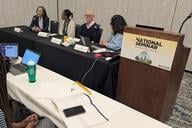You have /5 articles left.
Sign up for a free account or log in.
A referendum on the North Carolina ballot next month to ban gay marriages and civil unions has created an awkward position for colleges that condemn discrimination but can’t take public stances on political issues.
Ten student senates have renounced the measure, as has the Faculty Senate at public Western Carolina University.
Both chambers of the state legislature last year approved putting the measure to a popular vote, and the amendment will be on the May 8 ballot.
College administrations have generally stayed away from the issue, but Duke University issued a statement that skirted the issue but expressed support for gays, and students across the state have mobilized against the measure. Duke offers full spousal benefits for the domestic partners of its employees.
In the statement released by a university spokesman, Duke said it respected the rights of gay employees and students and that offering benefits to their partners gives them a strategic advantage. "We believe recognizing the families of LGBT faculty, employees and students by offering these and other benefits is essential for Duke to recruit, retain and nurture excellence in all our endeavors," the statement read.
Jen Jones, spokeswoman for a group campaigning for the amendment’s defeat, said college students have been among the most vehement critics of the ballot measure, called Amendment One.
Even statehouse Speaker Thom Tillis, a Republican who supports the constitutional ban, seems to see a generational gap. He told North Carolina State University students that he’d expect the amendment to pass this spring and then be repealed within two decades, according to a student newspaper account repeated statewide. Jones said that account, while no doubt frank, betrays a clear divide between the majority of college students and the older voters who support the amendment.
“The sentiment is clear from students,” she said. “ 'You’re doing this now but we’re going to have to clean up this mess.' We see this anger and frustration on Amendment One really transfer over to a campus level.”
That’s happening at Appalachian State University, where freshman Jocelyn Hunt has helped lead a campus effort to vote down the amendment. She organized early polling at the college and set up booths where students can get information about what she sees as a grave threat to the state.
To be sure, not all college students and employees are against the measure. Members of the Appalachian State College Republicans expressed support for the amendment.
Young voters – among the most likely to oppose the amendment’s passage – are also among the least likely to cast a ballot. The fact that the vote is on a day when many students are either taking finals or moving home provides an extra challenge for opponents, Jones said.
But colleges – even those affiliated with religious groups that oppose gay marriage – have been slow to take a stand on the measure. Among the four Christian institutions in the state that Inside Higher Ed reached out to Friday morning, none expressed an institutional stance on the amendment.
Faculty senates have also hesitated to make their positions known. State law restricts the political involvement of public employees, and university lawyers are now considering whether Western Carolina’s 18-4 faculty vote overstepped those bounds, said Erin McNelis, the campus senate chair.
While colleges have been largely silent, student legislatures on several of the state’s largest campuses – including Duke, Eastern Carolina and North Carolina State Universities and University of North Carolina campuses in Asheville, Chapel Hill, Charlotte and Greensboro – have passed resolutions against the amendment. Student senators at North Carolina Central University and Guilford and Salem Colleges approved similar bills.
While Jones -- whose Coalition to Protect NC Families opposes the amendment – and others have focused on mobilizing college students and others against the proposal, it’s unclear what immediate impact the amendment’s passage might have.
The state already has laws barring same-sex marriage, and universities in North Carolina’s 16-campus public system can't offer major medical benefits to the same-sex partners of their employees under state law (though they can join campus gyms). At the flagship Chapel Hill campus, students can live on campus with their domestic partners and add them to student health plans at their own expense. A spokesman for the Chapel Hill campus said it was too early to know if the amendment would require any policy changes.
Supporters say a constitutional amendment eliminates the possibility of a state court overturning the current marriage laws. North Carolina is the only state in the South without a constitutional amendment banning gay marriage. Tillis, the legislator who suggested a generation gap, reaffirmed his support for the amendment in a statement and said he was confident voters would “preserve” and “honor” the state’s “traditional definition of marriage.”
Jones agrees there’s a generation gap, but believes there’s an effort by some amendment supports to marginalize the voices of young voters. Mobilizing college students, she said, could help ensure the measure doesn’t pass.
“Legislators are trying to sell a narrative that students not only don’t matter but aren’t supportive of [gay marriage],” she said. “It’s very clear to us when we travel to colleges and universities that they see this as a threat because it’s discriminatory.”




